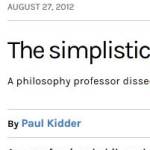Professor Paul Kidder published a short article entitled “The Simplistic Flaw in Ayn Rand’s Philosophy: A philosophy professor dissects the faulty logic in the libertarians’ favorite deep-thinker.” Kidder’s argument is that Rand’s position amounts to asserting that only entirely self-sufficient entrepreneurs have worth; consequently her philosophy is flawed in overlooking or ignoring the value that governments, unions, workers, and customers add.
that only entirely self-sufficient entrepreneurs have worth; consequently her philosophy is flawed in overlooking or ignoring the value that governments, unions, workers, and customers add.
I appreciate that Kidder’s piece is written as a serious and straightforward argument, so let me respond with four quick points to alleviate his concerns.
1. The entrepreneur: Yes, indeed, Rand makes fundamental and celebrates the value creation that entrepreneurs achieve. Creative productivity — and the initiative, courage, perseverance, and leadership necessary to that process — are central to her ethic. The heroes of her fiction and the self-responsible agents of her non-fiction are all either entrepreneurs or entrepreneurial — e.g., Hank Rearden, Dagny Taggart, and Howard Roark.
2. Government: Rand is a pro-government thinker, not an anarchist. In her politics, the police, the courts, and the military all perform essential services in protecting individuals’ rights. Her position is one of constitutionally-limited government — as evidenced by her non-fictional essays explicitly outlining the proper functions of government and in her fictional character Judge Narragansett, who is working on a revised and improved version of the U.S. Constitution. So Rand would agree with Kidder’s words that entrepreneurs need a political “infrastructure and a framework of the rule of law.”
3. Workers and customers: Businesses and their employees and businesses and their customers engage in mutually-beneficial trade; so absolutely Kidder is correct to point out that the win-win depends upon each party’s making a contribution. In voluntary transactions, both parties bring value to the exchange and help make possible the others’ gain. So important is this to Rand’s philosophy that she makes the Trader Principle the key principle of her social ethic.  And in her fiction, Rand frequently highlights with deep appreciation the genuine value exchange between employers and employees (e.g., Dagny Taggart and Eddie Willers) and entrepreneurs and customers (e.g., Howard Roark and Austen Heller).
And in her fiction, Rand frequently highlights with deep appreciation the genuine value exchange between employers and employees (e.g., Dagny Taggart and Eddie Willers) and entrepreneurs and customers (e.g., Howard Roark and Austen Heller).
4. Unions: Rand has no problem with unions as such, just as she has no problem with any form of business organization as such. Individuals in a free market can form voluntary associations to advance their economic interests, so of course workers are free to do so. What Rand objects to are compulsory and/or crony unionism, just as she objects to crony businesses — i.e., unions and businesses that lobby for and receive special government privileges. One of the villains in Atlas Shrugged is the politically-connected union leader Fred Kinnan, just as two of the other major villains in Atlas are politically-connected businessmen, Jim Taggart and Orren Boyle. Her point is that none of them is actually adding economic value; rather all are rent-seekers. (Interestingly, Rand portrays the union leader more sympathetically than the corrupt businessmen.)
One of the great paradoxes about the public discussion of Rand’s ideas is that Rand has a reputation for belaboring her points rhetorically long after they are clear — and yet her critics have great difficulty stating what those points are. I don’t know yet how critical Kidder would be about Rand’s actual views on how much government is needed and how to weight the value added by entrepreneurs, employees, and their customers. Hopefully the next round of discussion can focus on the substantive issues.
Perhaps his focus on the novelty of Rand championing entrepreneurs has blinded Kidder to the rest of her thought. Regardless, if it was a more mainstream figure his scholarship would be roundly trounced.
Kidder’s piece is not entirely a serious and straightforward argument. Before Kidder starts his argument, he writes:
“I see that Rand does not tolerate the philosopher’s patient tarrying with differing points of view but moves in quickly for the rhetorical kill. She seems to be moved by a passion — the libido dominandi, the desire for control — far more than by the gentle art of thinking. It is always astounding to me that some of the most educated members of our intellectual elites should swallow her arguments so gleefully, and I have to believe that it is more a function of their elitism than their intellectual capacities.”
Kidder commits two fallacies here. The first is the Genetic Fallacy when he says that Rand has a desire for control. Motives are irrelevant in determining that truth or falsehood of one’s claims. Someone may believe that 2+2 equals 4 only because their first grade teacher forced them to memorize it. Pointing this out however, is not a demonstration that 2+2 is false.
Next, Kidder gives us an Ad Hominem fallacy when he accuses Rand supporters of “elitism.” This is an obvious attempt to bias his readers in advance before he present his arguments. Did he think no one would notice?
Many if not most of Rand’s critics make me think of this remark by Ludwig von Mises:
“Marx and Engels never tried to refute their opponents with argument. They insulted, ridiculed, derided, slandered, and traduced them, and in the use of these methods their followers are not less expert. Their polemic is directed never against the argument of the opponent, but always against his person.”
– Socialism, p. 19
I have to agree with Edward Fox. Once again I find myself reading a criticism of Ms. Rand only to wade through too much preamble, promising to get to a valid point and failing to deliver. In this case so desperate for any form of validity, Kidder feels it necessary to waste time over her use of “he” and avoiding “she”. — Really, you’d think I’d given up reading so called claims of Objectivist fallacy by now.
Mr Hicks’ points are well made; I have nothing more to add.
Mr. Hicks,
The world is a better place with thinkers like you in it. Thank you for sharing your work and talents.
Thanks very much, Michael.
Is it me or are you gentlemen doing the same thing to Mr. Kidder as you are claiming he did to Ms. Rand? Regardless of preamble, “A is A” as the basis of “reason” is incorrect. “Tax is slavery” is incorrect. The way in which Rand deduces reason, which is the basis of her entire philosophy, is not right. That is the point of Kidder’s argument, not that objectivists are elitist. I’m not sure why anyone hasn’t looked at that aspect of his argument?